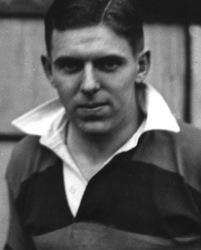Robert Wilson Shaw
 | |||
| Full name | Robert Wilson Shaw | ||
|---|---|---|---|
| Date of birth | 11 April 1913 | ||
| Date of death | 23 July 1979 (aged 66) | ||
| Place of death | Glasgow, Scotland | ||
| Rugby union career | |||
| Playing career | |||
| Position | Fly-half, wing, centre | ||
| Amateur clubs | |||
| Years | Club / team | ||
| Glasgow HSFP | |||
| Provincial/State sides | |||
| Years | Club / team | Caps | (points) |
| Glasgow District | |||
| National team(s) | |||
| Years | Club / team | Caps | (points) |
| 1934–1939 1936 |
Scotland Great Britain Barbarians |
19 0 |
(28) (0) |
| correct as of 2007-12-23. | |||
Robert Wilson Shaw CBE (11 April 1913 – 23 July 1979) was a Scottish rugby union footballer who played for Scotland in 19 Tests between 1934 and 1939.[1][2] Shaw played club for Glasgow High School Former Pupils,[2] and could play in several positions in the backline; including wing, centre and fullback. He first represented Scotland in 1934 when he played all three of her Home International Championship matches (against England, Ireland, and Wales). He scored his first try in the Calcutta Cup match against England that year. He is most famous however for guiding Scotland to their Triple Crown victory over England at Twickenham in 1938. Shaw's performance was central to Scotland's 21–16 victory and he was carried off the field on the shoulders of his team-mates. The match became known as "Wilson Shaw's match". In 2002 Shaw was inducted into the Scottish Sports Hall of Fame.
Wilson Shaw also played the All Blacks in 1935 in a Combined Edinburgh and Glasgow XV.[2]
Shaw was selected for the Great Britain team that toured Argentina in 1936. Although no caps were awarded for the tour, Shaw was part of the one Test of the tour, a 23-0 victory over Argentina.[3]
1938 Triple Crown
Shaw participated in all three of Scotland's Championship matches in 1938. The first was against Wales which Scotland won 8–6 on 5 February. Although Scotland only scored one try to Wales two, their superior kicking gave them the victory. Their next match was against Ireland on 26 February, and again Scotland won—this time 23–14. Shaw had a good game, although he did not score any tries. The last match of the Championship was against England at Twickenham Stadium on 19 March. The match was played in front of 70,000 spectators. This was also the first ever rugby international to be televised. Shaw scored one try in the first half, and Scotland led 12–9 at the break. In the second half Scotland frequently penetrated the England defence. Shaw came close several times to scoring a second try, before three minutes from full-time to help Scotland to a 21–16 win. Scotland had outscored England five tries to one, and Shaw was widely credited with inspiring the win. The match became known as "Wilson Shaw's match".[4]
Since France was still banned from the competition at this stage, this would have been the nearest thing to a Scottish Grand Slam.[2]
Playing attributes
Shaw's playing qualities were considered somewhat of an enigma. He was fast, could run well, could pass and dummy pass, and could sidestep many defenders. However Shaw was considered a flawed genius due to his inconsistency. Whilst he was without equal on his day, he could also produce performances equally as poor. The weakest technical aspect of his game was considered his kicking, and his defence could also be poor. Despite this, following the Triple Crown winning victory over England in 1938, the press proclaimed him "the greatest rugby player of his generation".
Seasoned player and journalist J.B.G. Thomas wrote of Glasgow High School FP fly-half Wilson Shaw "I cannot ever remember seeing an outside half with greater speed off the mark than shaw."[2]
Richard Bath writes:
- "Shaw was so consistently outstanding at fly-half that became Scotland's regular No. 10, eventually becoming captain and leading Scotland to the Triple Crown in 1938."[2]
His brother Ian was also a Scotland cap.
References
- Bath, Richard (ed.) The Complete Book of Rugby (Seven Oaks Ltd, 1997 ISBN 1-86200-013-1)
- ↑ Wilson Shaw rugby profile ESPN Scrum.com
- 1 2 3 4 5 6 Bath, p158
- ↑ "La Unión de Rugby del Río de la Plata". UAR.com. 1937. Retrieved 20 March 2011.
- ↑ "Robert Wilson Shaw, CBE". sshf.co.uk. Retrieved 2007-12-22.
External links
- "Wilson Shaw". scrum.com. Retrieved 2007-12-22.
- Llewellyn, Dai. "TWICKENHAM WALL OF FAME" (pdf). rfu.com. Retrieved 2007-12-22.
- MacDonald, Paul. "The 1938 Triple Crown". bbc.co.uk. Retrieved 2007-12-22.